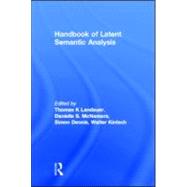
Note: Supplemental materials are not guaranteed with Rental or Used book purchases.
Purchase Benefits
Looking to rent a book? Rent Handbook of Latent Semantic Analysis [ISBN: 9780805854183] for the semester, quarter, and short term or search our site for other textbooks by Landauer, Thomas K.; Mcnamara, Danielle S.; Dennis, Simon; Kintsch, Walter. Renting a textbook can save you up to 90% from the cost of buying.
| Preface | p. ix |
| Introduction to LSA: Theory and Methods | |
| LSA as a Theory of Meaning | p. 3 |
| Mathematical Foundations Behind Latent Semantic Analysis | p. 35 |
| How to Use the LSA Web Site | p. 57 |
| Creating Your Own LSA Spaces | p. 71 |
| LSA in Cognitive Theory | |
| Meaning in Context | p. 89 |
| Symbolic or Embodied Representations: A Case for Symbol Interdependency | p. 107 |
| Semantic Structure and Episodic Memory | p. 121 |
| A Semantic Space for Modeling Children's Semantic Memory | p. 143 |
| Discourse Coherence and LSA | p. 167 |
| Spaces for Problem Solving | p. 185 |
| LSA in Educational Applications | |
| Assessing and Improving Comprehension With Latent Semantic Analysis | p. 207 |
| Evaluating Self-Explanations in iSTART: Comparing Word-Based and LSA Algorithms | p. 227 |
| Using LSA in AutoTutor: Learning Through Mixed-Initiative Dialogue in Natural Language | p. 243 |
| Summary Street: Computer-Guided Summary Writing | p. 263 |
| Automated Tools for Collaborative Learning Environments | p. 279 |
| Information Retrieval and HCI Applications of LSA | |
| LSA and Information Retrieval: Getting Back to Basics | p. 293 |
| Helping People Find and Learn From Documents: Exploiting Synergies Between Human and Computer Retrieval With SuperManual | p. 323 |
| Automating Usability Evaluation: Cognitive Walkthrough for the Web Puts LSA to Work on Real-World HCI Design Problems | p. 345 |
| Extensions to LSA | |
| Optimizing LSA Measures of Cohesion | p. 379 |
| Strengths, Limitations, and Extensions of LSA | p. 401 |
| Probabilistic Topic Models | p. 427 |
| Introducing Word Order Within the LSA Framework | p. 449 |
| Conclusion | |
| LSA and Meaning: In Theory and Application | p. 467 |
| Author Index | p. 481 |
| Subject Index | p. 491 |
| Table of Contents provided by Ingram. All Rights Reserved. |
The New copy of this book will include any supplemental materials advertised. Please check the title of the book to determine if it should include any access cards, study guides, lab manuals, CDs, etc.
The Used, Rental and eBook copies of this book are not guaranteed to include any supplemental materials. Typically, only the book itself is included. This is true even if the title states it includes any access cards, study guides, lab manuals, CDs, etc.